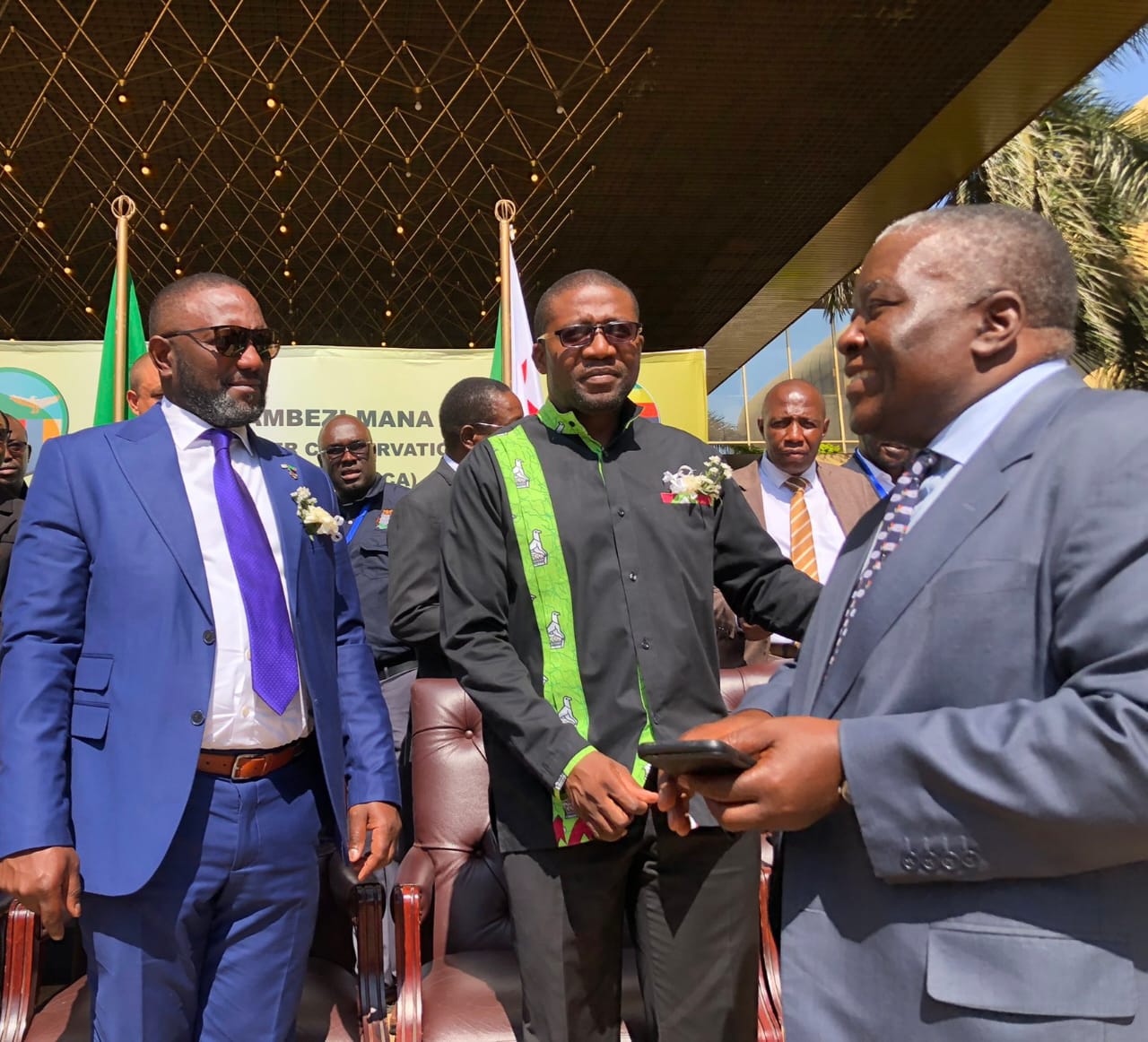|
Getting your Trinity Audio player ready…
|
By Elvis Dumba
Harare – Zambia and Zimbabwe have committed to strengthening cooperation that will improve protection for the environment and natural resources.
The two countries signed a memorandum of agreement on the Lower Zambezi Mana Pools (LOZAMAP) Transfrontier Conservation Area (TFCA).
The signing ceremony was held in Harare a day after the continent celebrated Africa Day.
Environment Ministers of the two countries signed the agreement.
“We, the designated Ministers responsible for the establishment, coordination, development, and management of the Lower Zambezi Mana Pools (LOZAMAP) Transfrontier Conservation Area (TFCA) represented by the Government of the Republic of Zambia through the Minister of Tourism, and the Government of the Republic of Zimbabwe through the Minister of Environment, Climate, Tourism and Hospitality Industry, signed a Memorandum of Understanding (MoU) to formally establish the TFCA. The TFCA measures approximately 17745km2 covering main National Parks (Lower Zambezi and Mana Pools), Game Management Areas, Safari Areas, Communal land, private land, and conservancies.
“We are delighted today because this event represents our joint resolve and dedication to advancing our mutual partnership in the area of transboundary collaboration through the conservation of our natural resources. This achievement is consistent with the Southern African Development Community Protocol on Wildlife Conservation and Law Enforcement which urges Partner States to collaborate and promote the conservation of shared wildlife resources through the establishment of TFCAs,” Part of a joint statement released by the two ministers read.
The MOU is expected among other things to foster trans-national collaboration and cooperation between the two countries in implementing ecosystem management through the establishment, development, and management of the LOZAMAP TFCATo promote alliances in the management of biological natural resources by encouraging social, economic, and other partnerships among the stakeholders.
It is also expected to enhance ecosystem integrity and natural ecological processes by harmonizing environmental management procedures between the Parties and strives to remove artificial barriers impeding the natural movement of animals, develop frameworks and strategies whereby local communities can participate in, and derive tangible benefits from, the management and sustainable use of natural resources that occur within the LOZAMAP TFCA and to facilitate the establishment and maintenance of a sub-regional economic base by way of appropriate development, frameworks, strategies, and work plans among other things.
Zimbabwe’s Minister of Environment, Climate, Tourism, and Hospitality Industry, Hon Nomangaliso Ndlovu said the initiative will enhance and open a new tempo in sustainable development programs
“This initiative is not a new line of business and it is by no means an end in itself but constitutes the opening of new opportunities for our two Governments, local communities, and stakeholders to build tempo on Sustainable Development Programmes and ensure that all the participating players and stakeholders are strategically positioned for equitable sharing of tangible benefits.
the LOZAMAP TFCA Programme provides huge opportunities and ample space for the implementation of the provisions of the SADC Treaty with a focus on cooperation and integration through joint planning and implementation of specific Biodiversity Conservation, Law Enforcement, Investment, Eco-tourism, Business Development Programmes, and Projects. Zambia and Zimbabwe are already collaborating in several existing programs, including the Kavango Zambezi and Zimbabwe Mozambique Zambia Transfrontier Conservation Areas, joint energy development and power generation on the Zambezi River, Water Resources Conservation and Management on the shared Lake Kariba,” he said.
“We must expedite the planning and implementation of initiatives for local communities to realize meaningful benefits in our quest to attain an upper-middle-income economy by 2030. By the same token, we acknowledge that it took us a long to get the MoU signed and we may need to expedite the drafting of the Treaty so that we create the foundations for the formal establishment and implementation of the LOZAMAP TFCA for sustainable development and facilitation of equitable benefit sharing,” he added.
Peace Parks Foundation, the Africa Wildlife Foundation, the United Nations Development Programme, and the Global Environment Facility are some of the organizations in the country that worked tirelessly in contributing towards the preservation of the resources.
Zambia”s Minister of Tourism, Rodney Sikumba said Zambia is ready in conserving natural resources through cooperation.
“Allow me to reaffirm the commitment of the government of Zambia under the leadership of President Hakainde Hichilema, towards sustainable management of natural resources in general and in particular the conservation of this beautiful and wild landscape that has been exemplified through the signing of this MOU today. As I stand here today representing my government, we are very delighted that this memorandum of understanding for the development of this TFCA has been actualized after 13 years of continued efforts by the republics of Zambia and Zimbabwe. This signing of the MOU is a big step towards the sustainable development of LOZAMAP – TFCA into an established TFCA” he said during the signing ceremony.,” he said.
“The LOZAMAP –TFCA MOU reflects the SADC community protocol on wildlife conservation and law enforcement that encourages partner states to collaborate and promote the conservation of shared wildlife resources through the establishment of TFCAS. this achievement today will inevitably promote peace and stability, ensure the sustainable utilization of natural resources, provide economic development opportunities through nature-based tourism as well as address food and nutrition security as recognized by the SADC – TFCA framework.
“It is worth mentioning that the primary focus of this partnership is to conserve this landscape by fostering the connectivity of the landscape and joint sustainable utilization of natural resources for the benefit of present and future generations,” Minister Sikumba who represented the Zambian government told delegates at the signing ceremony in Harare.
There has been an uproar in recent days by conservationists over proposals by an exploration firm to explore for minerals in the vast wildlife sanctuary of Mana Pools and the agreement will go a long in ensuring the protection of the environment and animals in the area.
